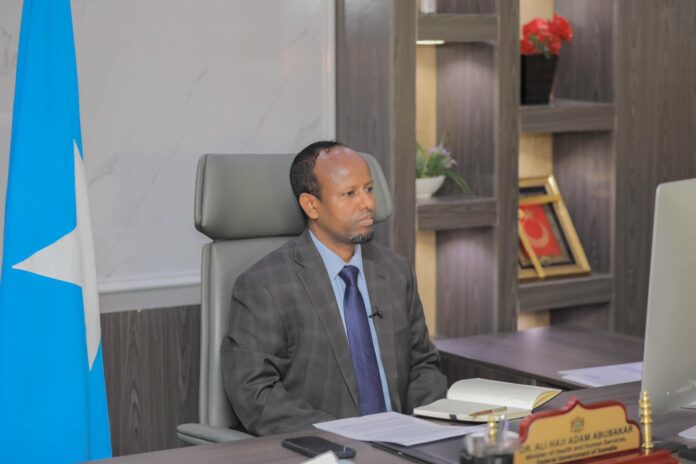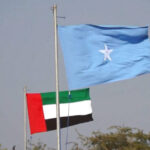Somalia’s Minister of Health and Human Services His Excellency Dr Ali Haji Adam and high-level representatives of the Global Polio Eradication Initiative met virtually yesterday to review progress and further scale up efforts to end the country’s 7-year variant poliovirus outbreak.
H.E. Dr Adam presented the Somalia Emergency Action Plan (SEAP) 3, which builds on measures taken so far and will fill existing gaps in polio eradication efforts. The plan prioritizes robust, high-quality polio vaccination campaigns and better poliovirus surveillance. Efforts will also be targeted at high-risk populations in hard-to-reach areas and where variant poliovirus is circulating, as well as underserved, displaced and nomadic communities.
The Minister also shared updates on the planned Big Catch-up campaign, which aims to accelerate vaccination of zero-dose children – who have received no vaccines – and capitalize on integration with other health and nutrition services.
Meeting delegates included Dr Chris Elias, Chair of the Polio Oversight Board and President of Global Development, Bill & Melinda Gates Foundation; Mr John Vertefeuille, Director, Global Immunization Division, United States Centers for Disease Control and Prevention; Ms Patience Musanhu, Senior Country Manager, Country Programmes Delivery at Gavi, the Vaccine Alliance; Ms Etleva Kadilli, United Nations Children’s Fund (UNICEF) Regional Director for Eastern and Southern Africa; and Dr Hamid Jafari, Director, Polio Eradication, World Health Organization (WHO) Eastern Mediterranean Region. Ms Wafaa Saeed Abdelatef, UNICEF Representative in Somalia, and Dr Reinhilde Van de Weerdt, WHO Representative to Somalia, also joined the meeting.
“Stopping poliovirus transmission is one of our government’s top priorities,” said H.E. Dr Ali Haji Adam, Minister of Health and Human Services for Somalia. “We are deeply committed to providing our children better access to vaccines that protect them from polio and other easily preventable diseases, alongside other essential health and nutrition services.”
The ongoing variant poliovirus outbreak, the longest running of its kind, has so far paralysed 38 children in Somalia. Through SEAP 3, Somalia will continue to work with humanitarian partners to reach about 1.5 million zero-dose children, most of whom live in the country’s highly populated central and southern areas.
“We applaud the Government of Somalia for their progress in eradicating polio and increasing access to immunization for all people living in Somalia. With continued commitment and momentum, Somalia will stop transmission of polio, improve immunization coverage, and enable a healthier society,” said Dr Chris Elias, Chair of the Polio Oversight Board and President of Global Development, Bill & Melinda Gates Foundation.
Somalia is seen as one of the world’s 6 most critical locations for polio transmission, known as consequential geographies, owing to the high risk of poliovirus spread to other countries.
“We commend the dedication of Somalia’s leadership towards urgently preventing any further transmission and spread of polio, currently the only public health emergency of international concern,” said Dr Hamid Jafari, Director, Polio Eradication, WHO Eastern Mediterranean Region. “We call on all humanitarian and development agencies in Somalia to support the government in its critical endeavours.”
“We are grateful for the government’s commitment and leadership that has started to revitalize efforts towards polio eradication,” said Ms Etleva Kadilli, UNICEF Regional Director for Eastern and Southern Africa. “The upcoming Big Catch-up vaccination campaign is a great opportunity to accelerate progress and narrow the chronic immunity gap. Reaching unvaccinated children is challenging and strong leadership at the federal and state levels is crucial to Somalia’s efforts to eliminate vaccine-preventable diseases. UNICEF stands by at all levels to support the efforts of the Somali people and government.”
Somalia is also currently grappling with a measles outbreak. The country faces complex challenges, including recurrent drought, floods and persistent insecurity, which have affected health service delivery and spurred population movement over the years.





